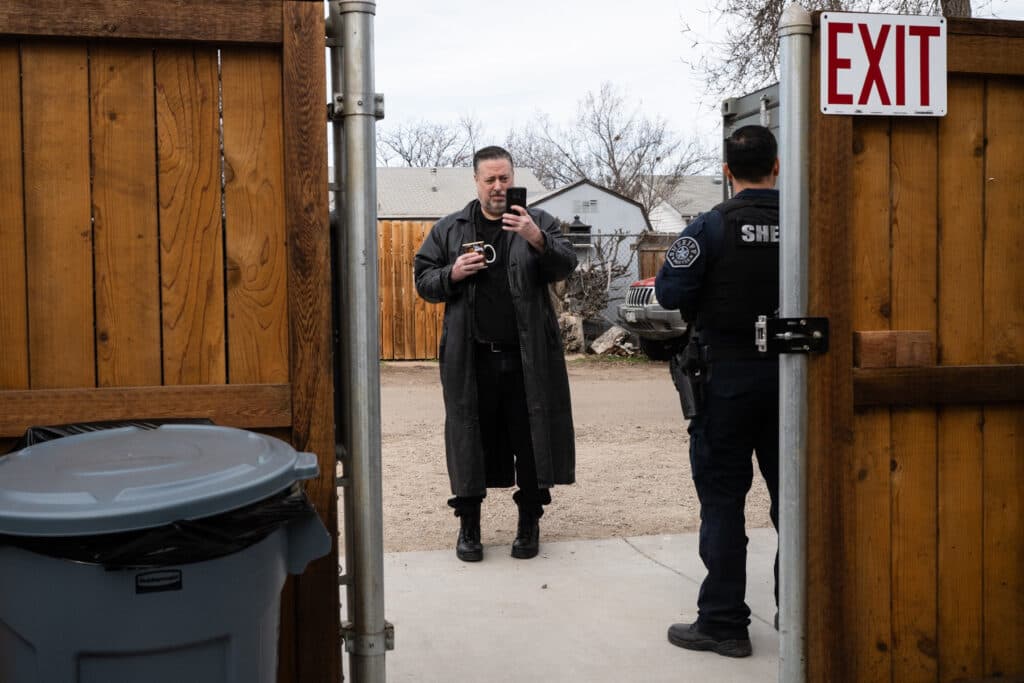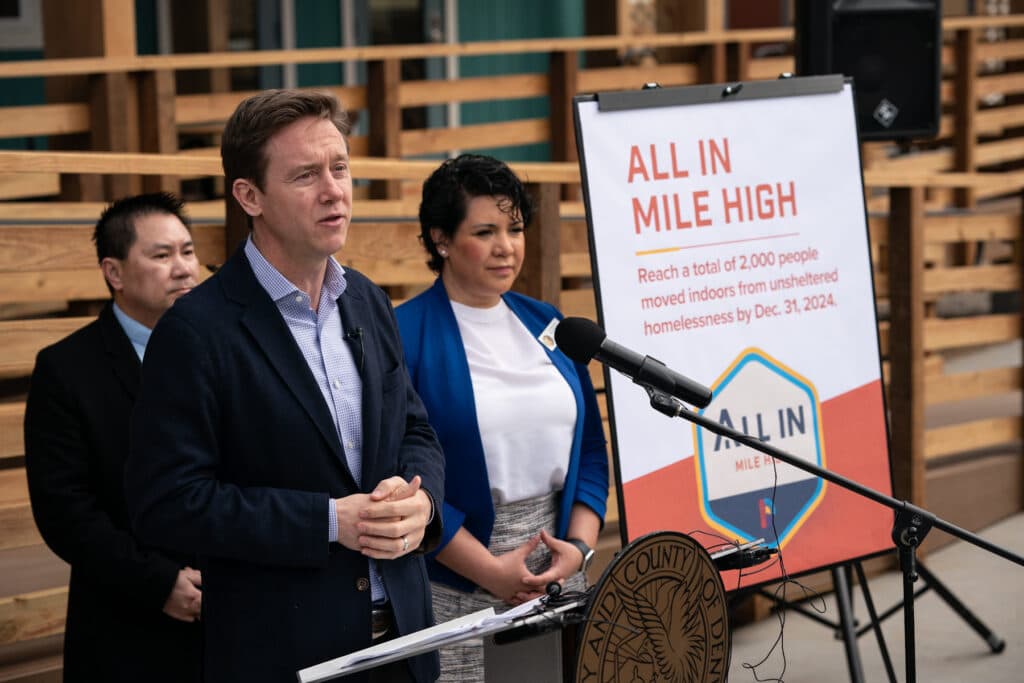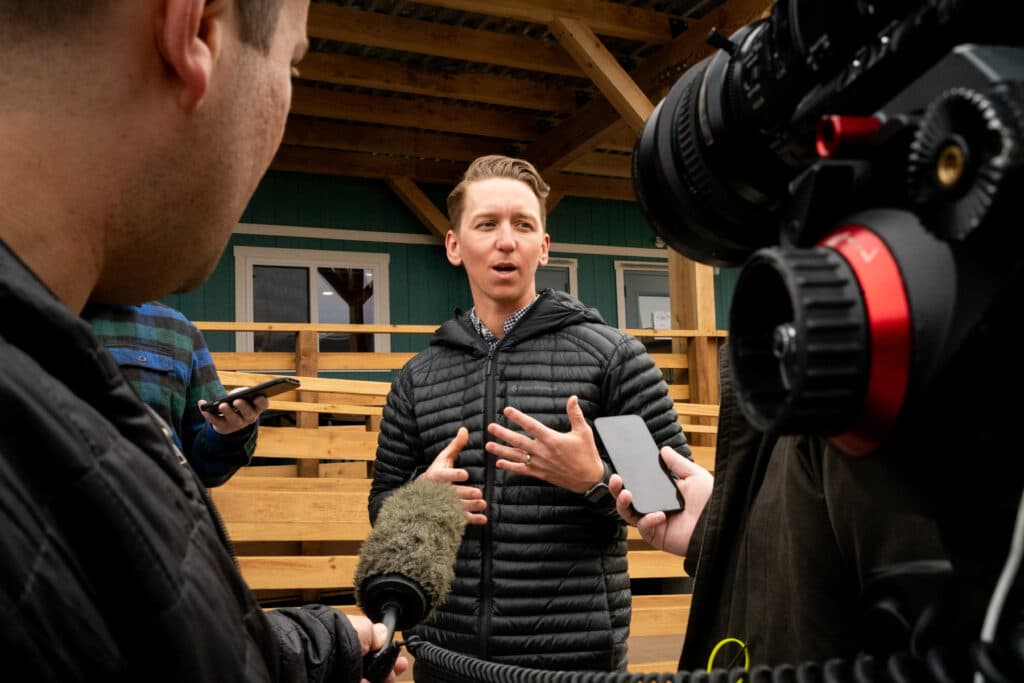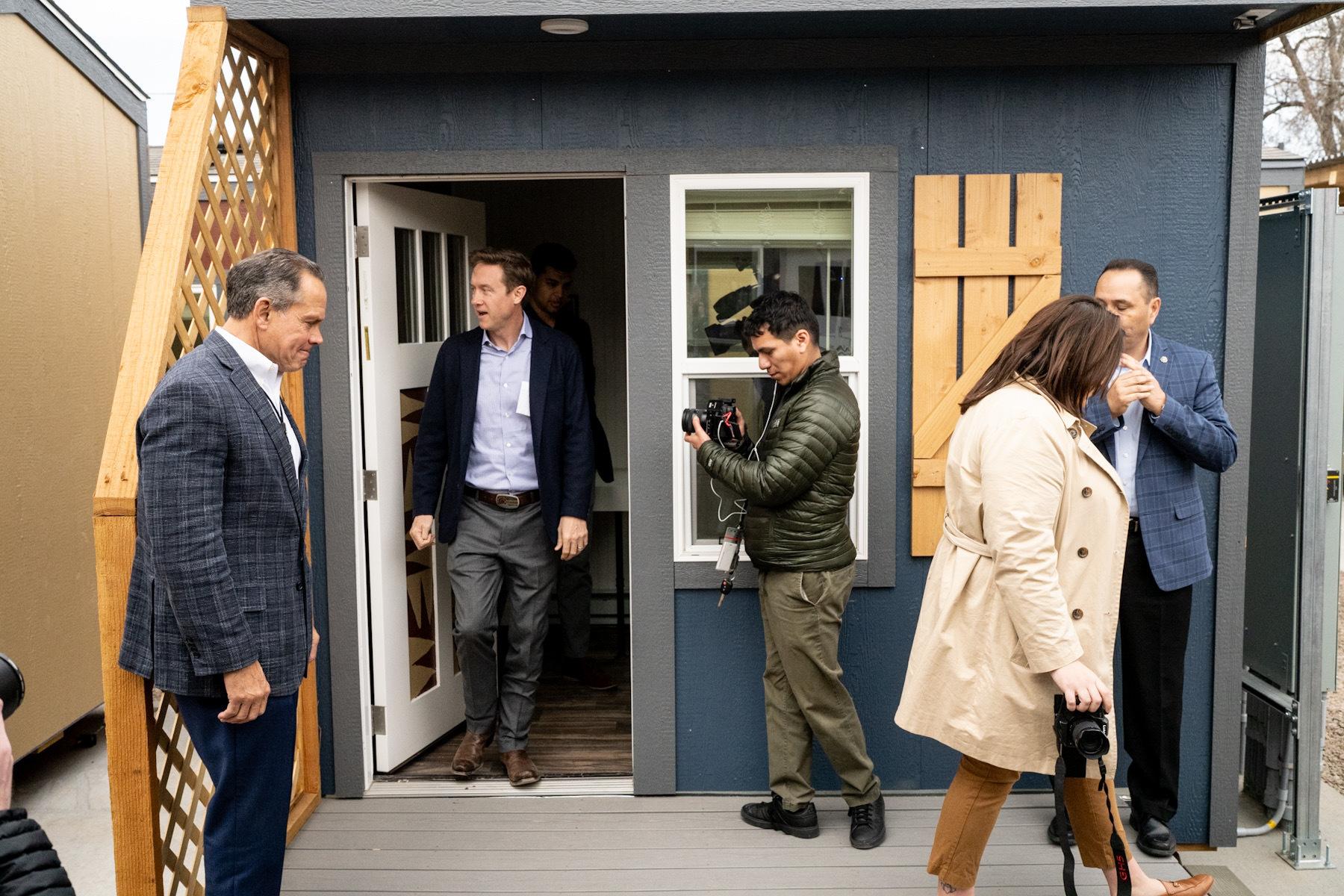This week, Mayor Mike Johnston’s second-to-launch micro community, dubbed La Paz, will open in the Overland neighborhood as a long-term shelter for people currently sleeping at an encampment in the Lincoln Park neighborhood at Colfax Avenue and Umatilla Street.
The 60 tiny homes manufactured by Oakwood Homes will welcome in 47 people from an encampment on Tuesday.
The project will be run by Colorado Village Collaborative, a nonprofit organization that has used tiny homes as one solution to bring people indoors from unsheltered homelessness in recent years.
Many on the staff, hired before the project's launch was delayed over neighborhood concerns, are well trained, eager to open and looking forward to helping people move tomorrow.
"They've been out at the encampment meeting with folks," said Senior Director of Homelessness Programs Cuica Montoya, with the Colorado Village Collaborative. "We really value those connections, so that people know that we're just human beings. We're here to help support you along your way."
The Salvation Army will provide residents three meals a day, while the Colorado Coalition for the Homeless will bring in a mobile clinic each week to offer wraparound services.
There will also be services from on-site staff 24/7.
"They get daily peer counseling and case management," said Colorado Village Collaborative's Chief Executive Officer Dede de Percin. "That's full-time."
Wooden fencing encircles the tiny home village, situated between a quiet, residential part of the Overland neighborhood and rumbling cars driving by on Santa Fe Drive.
The tiny homes are truly tiny, with a narrow pallet bed, a desk and a window. Restrooms, showers, a kitchen and laundry are available in an adjacent community room.
The rooms are meant to be temporary housing with the goal being to eventually move people into permanent homes.
But how? That's the question on the mind of District 7 Councilmember Flor Alvidrez.
“One of my biggest concerns is how are we going to get people that come live in the microcommunity or that live in the hotels out of them and into housing, so that that space frees up for new people,” Alvidrez told Denverite.
Some neighbors in Alvidrez’s district are uncertain about having 60 tiny homes in their community.
Randy Cain, who lives near La Paz, stood outside the gates of the tiny home village, sipping coffee and watching the hoopla.
“I’ve never felt this disrespected in all my life,” he said.
He said he's not had good relationships with people experiencing homelessness. He’s concerned about drug use and public urination, and he’s collecting evidence and plans to sue the city over the project.
“It's horrifying,” he said. “I bought my house 16 years ago. And this got thrown upon me. I'm not happy about it. I’ve never had good interactions with the homeless. I know that there’s nothing I can do about it.”
Douglas Danger, who’s lived in the area for more than 35 years, went inside the gates to hear what the mayor had to say and offer his criticisms.
“I think they kind of pushed their way in here knowing that they wouldn't get a big fight like they do over in the other bigger neighborhoods,” Danger told Denverite.

Danger visited the encampment and Colfax and Umatilla, where people will move in from.
“I'm not afraid of much,” he said. “I'll stick my hand in a bucket of spiders. Not a problem. But I had to get out of there because I was afraid. I saw three guys, three people openly shooting up. I mean, where I could tell that's exactly what they were doing. I saw a guy defecate, literally poop just right out in the open, no concern for anything. Another guy was playing on the train tracks.”
To prepare for what he believes will be a spike in crime in the neighborhood, he has purchased security cameras for his property.
“It's making me afraid,” he said. “And it really makes me scared that they steamrolled this over us and didn't listen to a single thing.”
Part of what feels unfair to Danger is the homelessness solution isn’t being shared across the city council districts, including in District 5, where he says “the rich people live.”
“I think it's really unfair how the mayor promised all districts would get one, but it just seems to be this is the one they're concentrating on — and in district eight — and nobody else is sharing the burden as promised,” he said.
It’s been a criticism waged by City Councilmember Stacie Gilmore, who has said she fears Johnston is consolidating poverty in neighborhoods with fewer resources.
District 8 Councilmember Shontel Lewis, whose community has the majority of shelter beds created under Johnston, has said she’s proud of the work and hopes it encourages other communities to get involved.
But Danger acknowledges that even if every district had a microcommunity, he'd still think the Overland site was a bad pick.
Community concerns delayed the opening of the microcommunity for months.
Johnston, who has held dozens of community meetings over the creation of new shelters at which he's faced intense public criticism, views the city’s process in the Overland neighborhood as exemplary.
“We think this is a great example of the way a process like this should work,” Johnston said. “You know, we were looking for sites all over the city. We know when we announced sites that communities were going to have feedback and questions. They brought us those questions. They brought those concerns. Councilman Alvidrez brought those questions and concerns. And we learned we got better we adjusted the design."
For example, the city beefed up promised security patrols in the neighborhood and installed multiple cameras at the site, monitored from an office in the community house.

The city also slashed the number of residents La Paz could accommodate in half, from 120 to 60 — at least, for now.
“So this entire block, all down to Wesley, is set up for approximately 120 units,” the mayor’s spokesperson Jose Salas said. “But in collaboration and talks with Councilwoman Alvidrez and the community, we have an agreement to start with 60 units. In a few months, six months or so, we'll have those conversations again with the community and the councilwoman to see the success of the community and then the potential expansion to add more units.”
When Johnston came into office, he promised communities like La Paz would be a cheaper, easier solution to homelessness, but he's largely focused on creating shelter at city-purchased motels and hotels.
During the 2023 mayoral race, he put microcommunities with tiny homes at the center of his homelessness strategy. He even hired Cole Chandler, the former head of Colorado Village Collaborative who was instrumental in bringing tiny homes to Denver as a homelessness solution, as his senior advisor on homelessness.
But during the mayor’s first six months, he' s largely focused on hotels and motels the city has purchased that are faster to bring online and have the benefit of providing greater density for a longer term.
Tiny home projects can only be zoned as such for four-year stints. While they cost between $25,000 and $30,000 per unit, the buildout of the overall community can jack those prices up dramatically. Hotels and motels cost roughly $100,000 per unit to bring online, but they provide a more permanent investment.

While the city has created more long-term shelter in hotels and motels and appears to have slowed down its acquisition of tiny home lots, there’s still a lot Johnston likes about them.
“The benefit of these sites is the communities are a little bit smaller,” he said. “If you've been living outdoors or unsheltered, it's nice to be in a community where you know everybody, familiar faces, you have your own independent unit. And so it provides a little different sort of privacy.”
As of Monday, since Johnston took office, the city has sheltered 1,293 people, with 369 of them securing permanent housing, according to the city's dashboard.
Johnston said he hopes to raise that number to 2,000 by the end of the year. During the last six months of 2023, he dubbed the effort House1000. He's changed the name for 2024 to All in Denver.
"We call it All In, because the goal is quite literally to get all of our Denver residents inside," Johnston said. "And that means people that are sleeping, unsheltered on the streets, we want all folks indoors."












